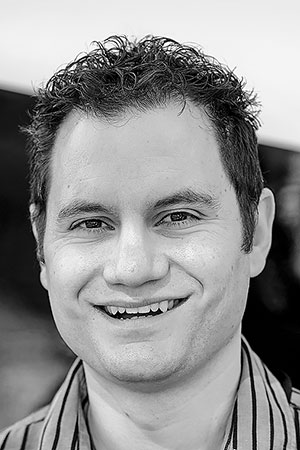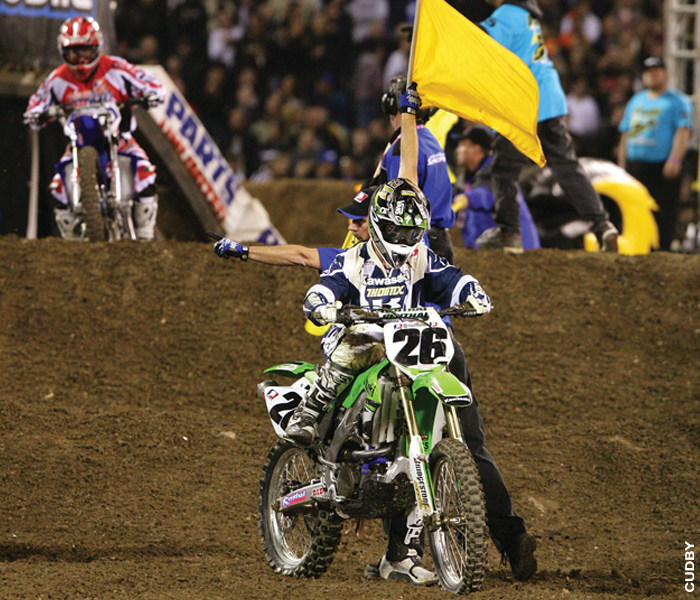

By JASON WEIGANDT ![]() @JASONWEIGANDT
@JASONWEIGANDT

By JASON WEIGANDT ![]() @JASONWEIGANDT
@JASONWEIGANDT

arvin “Magic” Johnson once tried coaching in the NBA, and it went terribly. His stint with the Lakers in 1994 ended with a 5-11 record and Magic quitting early while muttering about young kids who didn’t have respect for the veterans of the game.
In 1997, Magic’s old rival Larry Bird was named coach of the Indiana Pacers, so the league braced for similar problems. How would Larry deal with these young, cocky, disrespectful players? Bird provided one of my favorite explanations in the history of sports, saying, essentially, that he wanted his young players to be disrespectful to the vets. The goal isn’t to respect other players, it’s to beat them.


On Friday night before the Florida National, my NBCSN broadcast partner Grant Langston and I attended a dinner party with members of the Rocky Mountain ATV/MC-KTM-WPS team. Team manager Michael Byrne started telling some stories, then Langston joined in. That’s when the good stuff started to come out—the hidden battles you’d never hear about in the press or on the podium. In NBA circles, it’s well-known that Larry Bird seemed like a nice guy off the court but was a trash-talking assassin on it. You only get the good stuff from athletes who have been between the lines.
Now, this is not surprising from my buddy Langston, who seems to have at least one “I smashed him” story from every rider he lined up against. For example, RM-ATV/MC team owner Forrest Butler mentioned Robert Jonas, now one of the heads of KTM racing worldwide, which reminded Langston that he first met Jonas after cleaning him out at a GP back in the day.
Maybe Langston used take-outs as handshakes. These stories are hilarious, and the list is quite long. My favorite is the time he turned right into Travis Pastrana in a qualifying race at the 2000 Motocross des Nations, just because Travis was the hyped-up American and GL wanted to establish himself. He and Travis continued smashing into each other the next year, with plenty of Mike Brown smash-ups thrown in for good measure. But whenever Langston sees Brown or Pastrana at a race now, they act like best buds! Also, GL once got into a stuffing match with a privateer at the Atlanta Supercross and was DQed by then-AMA manager Steve Whitelock. GL then went into the AMA semi to bark some trash talk Whitelock’s direction. “GL, that’s probably not helping things,” his boss Mitch Payton told him.
You don’t expect to hear this stuff from Byrne, never known as a mercenary on the track. But old pros know where the line is drawn, and if someone crosses it, you have to pay them back.
“You race people the way they race you,” says Byrne, who then mentioned Nick Wey, Andrew Short, and Ivan Tedesco as guys who would get aggressive in his day. (Langston had similar stories about Short, forever known as the smiling assassin.)
Byrne had one crazy story from a supercross in 2006, when he and Wey were battling for fifth and took each other out on the last lap. Wey got up first, crossed the finish line, and rode right back over to Byrner to start yelling. Byrne was still in the race, picking up his bike and starting it, and had not crossed the finish yet! Still, Byrne harbored no ill will toward Wey, then or now. This was just racing.
One thing Byrne doesn’t understand is that modern racers don’t feel like they should take out anyone who is faster than them. Byrne says in his day, it didn’t matter if someone was faster than you—if he hit you, you owed him a payback. Plus, if you hit someone, it actually motivated you to ride faster and try to get away!
Get a couple of old racers in a room and you’re not going to hear anything but rugged war stories from the edge. As for today’s young punks? They’ll be telling the exact same stories 15 years from now. ![]()

